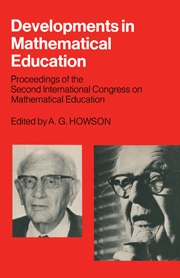 Developments in Mathematical Education
Developments in Mathematical Education Book contents
- Frontmatter
- Contents
- Editor's Acknowledgements
- PART I A CONGRESS SURVEY
- PART II THE INVITED PAPERS
- As I read them
- Comments on mathematical education
- The Presidential Address
- What groups mean in mathematics and what they should mean in mathematical education
- Nature, man and mathematics
- Some anthropological observations on number, time and common-sense
- Mathematical education in developing countries – some problems of teaching and learning
- Some questions of mathematical education in the USSR
- Modern mathematics: does it exist?
- PART III A SELECTION OF CONGRESS PAPERS
- Appendices
- Index
Some questions of mathematical education in the USSR
from PART II - THE INVITED PAPERS
- Frontmatter
- Contents
- Editor's Acknowledgements
- PART I A CONGRESS SURVEY
- PART II THE INVITED PAPERS
- As I read them
- Comments on mathematical education
- The Presidential Address
- What groups mean in mathematics and what they should mean in mathematical education
- Nature, man and mathematics
- Some anthropological observations on number, time and common-sense
- Mathematical education in developing countries – some problems of teaching and learning
- Some questions of mathematical education in the USSR
- Modern mathematics: does it exist?
- PART III A SELECTION OF CONGRESS PAPERS
- Appendices
- Index
Summary
At this time of unusually rapid change in the mode of life of all mankind, a time when science is being applied with increasing intensity to technology, the demand for scientific personnel – researchers and practical workers – has grown enormously. In particular, the demand for mathematicians has been especially great in recent years. Inevitably, the teaching of the basic sciences has lagged behind in all countries. Of the whole body of mathematical knowledge which I, and those who were students with me at Leningrad University, now require, very little was acquired whilst we were at university. University gave us the basis for something that it is difficult to express in words. Perhaps it taught us to think.
In the same way, what we are teaching young people now, in particular the mathematics we are giving them, will probably no longer meet the demands made on them in fifteen to twenty years time. And it is precisely fifteen to twenty years hence that their time will come. They will create the science and technology of the future.
On the other hand, in every country, and all the time, problems arise which will only be solved, either today or tomorrow, by specialists. These problems change very rapidly, before one's very eyes.
In recent years much has already been said about the necessity of conducting mathematical education from the very beginning on the most abstract level possible, concentrating attention on general mathematical ideas.
- Type
- Chapter
- Information
- Developments in Mathematical EducationProceedings of the Second International Congress on Mathematical Education, pp. 181 - 193Publisher: Cambridge University PressPrint publication year: 1973
- 1
- Cited by


